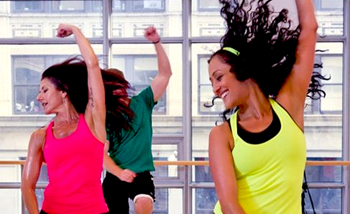Apr 5: Cardiovascular disease, diabetes, and osteoporosis - Indians are facing an unhealthy future burdened with a slew of lifestyle diseases. But instead of expensive medication and therapy, the cure lies in making exercise a compulsory part of everyday life, health experts say.
"Indians are increasingly leading a sedentary and machine-dependent life, which may seem comfortable but has extremely adverse effects on health," T.S. Kler, Head of the Department Cardiology, Fortis Escorts Heart Institute and Research Centre said.
 Kler said with increasingly hectic lifestyles, most Indians in urban areas nowadays do not walk to the neighbourhood store but rather order groceries on phone for home delivery or drive down.
Kler said with increasingly hectic lifestyles, most Indians in urban areas nowadays do not walk to the neighbourhood store but rather order groceries on phone for home delivery or drive down.
"We do not climb stairs any more, with lifts being omnipresent. Riding bicycles to work or to school is not cool in urban areas any more. Forget adults, this conditioning begins with children who prefer to stay indoors watching television or playing video games rather than spending time in the playground," he added.
"We all know that cardiovascular diseases are today a major health concern in India. They are the single largest leading cause of deaths in the country, and relatively younger people are today afflicted by coronary artery disease," the noted cardiologist said.
Various surveys done in India have shown that the incidence of coronary heart disease is 8-10 percent in urban areas and 5-6 percent in rural areas.
Kler said regular exercise can help prevent risk factors for cardiovascular diseases such as hypertension and type II diabetes. It also keeps the weight in check.
"Incidences of coronary artery disease can be reduced substantially if the entire Indian population religiously takes to physical exercise. Even 30 minutes of moderate exercise daily can be immensely beneficial. We need a national focus on this less-talked about subject," Kler said.
According to Rajeev K. Sharma, senior consultant orthopedics and joint replacement surgery, Indraprastha Apollo Hospital: "Adequate levels of physical activity decreases the risk of a hip or vertebral fracture and helps control weight. In fact, exercise is very crucial for maintaining good bone health, besides adequate intake of calcium."
"WHO estimates that globally, one in four adults is not active enough while more than 80 percent of the world's adolescent population is insufficiently physically active. This is a dreadful scenario as all these inactive people are making themselves vulnerable to several health issues," he said.
Osteoporosis-related injuries such as vertebrae fractures not only cause pain but also degrade the quality of life, curtail movement and increase dependence. Since the bone is a living tissue, it becomes stronger when subjected to exercise, Sharma said, adding that loss of bone mineral density that begins during the 30s can be curtailed by exercising regularly.
"People who exercise are found to have greater peak bone mass as compared to people who do not exercise."
According to the International Osteoporosis Foundation, the malaise annually causes more than 8.9 million fractures around the globe.
"Though exercising can, to a large extent, help in building strong bones, there is a general lack of an exercise culture in India. This needs to change. Schools, colleges and other institutions should take the lead in nurturing an exercising culture."
Harvinder Singh Chhabra, medical director and chief of spine services at Indian Spinal Injuries Centre, Vasant Kunj, said Indians generally do not realize the importance of exercising unless hit by an ailment.
"Many patients start walking regularly after back pain or osteoarthritis has already set in their bodies. We tell them they could have delayed it by being active all their lives," he added.
According to Chhabra, in the West, there is a lot of focus on physical activity and people are moving away from sedentary ways of life. "They are junking television and going for cycling, running, or adventure sports such as rock climbing. This shift is yet to take place in India."
To make exercise a national culture, apart from awareness, many enabling policy measures are also needed.
"In urban areas, several environmental factors discourage people from leading more active lives even if they want to. Lack of public spaces such as parks and grounds, safety issues on the roads, pollution and irksome traffic do not allow many people to step out of homes to run or walk. This needs to change," he said.
The latter half of the 20th century has brought substantial progress in disease control due to expansion of health infrastructure. With food and nutritional consumption also improving for a vast majority of population, life expectancy in India has gone up over the years. Experts say that deaths due to communicable diseases have decreased while those from non-communicable diseases (NCDs) have risen.
NCDs at present account for 53 percent of all deaths and 44 percent of disability adjusted life-years lost. Projections indicate a further increase to 67 percent of all deaths by 2030. Cardiovascular disease is the major contributor to this burden, attributable to 52 percent of NCD-associated deaths and 29 percent of total deaths.





Comments
Add new comment